Tag: quitting
Regaining Confidence After a Bad Work Experience
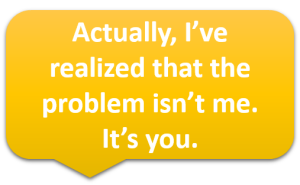 Bad jobs can hurt our souls. Humans thrive on contributing to things larger than ourselves, being productive, positive interactions with others and recognition for our efforts. A job is much more than a means to pay the bills.
Bad jobs can hurt our souls. Humans thrive on contributing to things larger than ourselves, being productive, positive interactions with others and recognition for our efforts. A job is much more than a means to pay the bills.
When a rotten manager tells you your work isn’t good enough – or you’re not good enough, it wounds your spirit. When coworkers blame and shame you, it rips little holes in your psyche. Even if you know that you add value to your company and that you do good work, even if you think your managers and their minions are idiots — constant negative feedback is damaging.
Many people who I’ve spoken with about quitting their jobs told me they lost confidence in themselves because of bad work experiences. These are people who have grown their careers, earned advanced degrees, or led initiatives that made millions of dollars for their companies. Some of them have tough reputations, and aren’t especially sensitive to criticism. Yet the negativity they endured made them unsure of themselves.
If you haven’t experienced a job like this and you’re not close to someone who has, you might be thinking, “If they were such great workers, why did their managers treat them so poorly?” Well, that is the reality of many organizations – whether military, education, corporate, religious or any other field — there is dysfunction. Often a team needs a scapegoat to blame for poor results, or to use as a target to vent their own insecurity and anger. Sometimes it is the company culture. Sometimes it is just crazy-making.
Feeling insecure about your value as an employee is not a great state to be in when searching for a new job. Interviewers can smell fear, and if you’re questioning your abilities, you may settle for a job you don’t want or accept a lower salary than you deserve.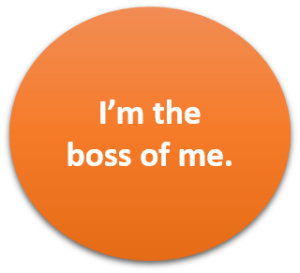
It took some people two or three years to regain their confidence and self-esteem after a terrible job, regardless of whether they were fired or quit on their own. Ugh. That is too long to let the jerks continue to have power over you. Fortunately, it doesn’t have to be this way. The people who bounced back quickly have this advice:
- Take back your power right now. Remind yourself as many times a day as you need to that this is your life. You get to choose whether you tell your coworkers “don’t talk to me like that” or quietly plot your exit while biting your tongue.
- You are more than your job. You are not your title, your company, or your salary. You are a whole person with many parts to your life. Know that your value as a human being is based on many things, but how your boss treats you is not one of them.
- You have skills and talents. When you feel low because you only hear what your manager thinks you are doing wrong, remember what you are good at. Write a list of your positive work traits if you need to. Take the Strength Finders test. Think of all you have accomplished in the past. When you’re scanning the job listings or updating your resume, this is the frame of mind to be in.
If you’ve left a horrible job or are currently in one, I hope you hold onto your self-worth and use what you’ve learned about the experience. You may come out on the other side with clearer boundaries, greater awareness of your strengths, and the confidence that comes from knowing that actually you are the boss of your own life.
Is Your Job Making You a Jerk?
Is Your Job Making You a Jerk? Here are a several signs of jerk behavior:
- Are you impatient with your coworkers and staff?
- Do you blurt out statements instead of thinking about how to phrase your communication in a way that will allow others to listen without getting defensive or hurt?
- Do you put a lot of effort into presenting yourself as if you are happier and calmer than you are?
- Do you frequently vent your frustration or complain to others?
If so, either you were already a jerk, or your job is not bringing out your best behavior. If you think that deep down you’re a nice person, or you used to be, there’s hope.
We’ve all heard the phrase “a toxic work environment.” Except instead of your bloodstream being poisoned by toxic chemicals in a non-OSHA approved factory, your soul is poisoned by absorbing too much negativity in the workplace. It might stem from a manager who rules by fear, or takes out his own fears on you. It might come from a team of colleagues who fill meeting rooms with hostility. Or there are office bullies and back-stabbers to contend with.
It might be that your official duties make no sense, you’re required to work so many hours that you’re constantly exhausted, or you’ve seen enough coworkers fired that you’re just waiting until the axe falls on you.
If you are surrounded by negativity you probably aren’t the friendly person everyone wants to eat lunch with in the cafeteria. It is draining to put effort into positive behavior when you are miserable at work. Over time, you lose your capacity to control it. You may be low on the scale that spans from “occasionally rude” to “a monster from hell”, but why be on the jerk scale at all if you can help it?
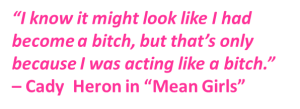 On the other hand, if you are non-stop cheerful despite working in a terrible environment, that is…not normal. You’ve either attained enlightenment or are detached from reality. Better to acknowledge the truth and then take action to change it.
On the other hand, if you are non-stop cheerful despite working in a terrible environment, that is…not normal. You’ve either attained enlightenment or are detached from reality. Better to acknowledge the truth and then take action to change it.
So what is the solution?
Quit.
Think about it: if you actually worked in a factory full of toxic chemicals, wouldn’t the best way to avoid poisoning your body be to stop exposing yourself to the toxins?
If you aren’t ready or willing to quit immediately, you can do a few things to protect yourself in the meantime. First, make a plan to quit! Save money, update your resume, network – you know the basics. Having a plan reminds yourself that you are empowered to make choices for your own life and that you are on a path leading to a better job.
Next, go ahead and vent – but only to one or two trusted coworkers who see the work environment the same way you do. Being able to tell someone about the crazy business decision that your boss just made will make you feel better, but only if your coworker gets why it is crazy and validates your frustration. Having a friend in the workplace who you can speak openly to without repercussions helps burn off that negative energy. It can also keep you from complaining to the wrong people – the people who are not on your side.
Finally, consider Dale Carnegie’s 30 principles from his book “How to Win Friends and Influence People”. All of the principles are useful to become a friendlier person and a more effective worker. My personal favorite is number 12: “If you are wrong, admit it quickly and emphatically.” When your jerk behavior gets the best of you, immediately apologize to the person you offended. Apologies show that you’re human, humble, and trying your best.
If your job is making you a jerk, know that it doesn’t have to be that way. You deserve a better workplace and a better attitude. Take steps to detox the negativity from your system. And be nice.
One More Thing Before I Quit
 When you’re planning to leave your job, there’s one more thing you may want to add to your checklist.
When you’re planning to leave your job, there’s one more thing you may want to add to your checklist.
Besides saving extra money, planning for your future healthcare, making sure you leave with all the compensation you’re entitled to, and all the other tasks like getting your personal data off of your company’s computer, writing a positive goodbye email, and so on, there’s one more thing.
But only you know what it is.
Whether you’re unhappy in your current job, or just ready to move on, there’s probably something you want to accomplish before you’re done there. It could be finally learning a new skill that you had been avoiding or completing a project that gives you credibility for your next role. It could be finishing a program or product that you’ve been immersed in, and want to see through to the end.
Maybe you’re finally ready to apologize to a colleague to resolve a mistake you made in the past. It could be standing up to a workplace bully to prove to yourself that you won’t accept that kind of behavior. Or, establishing boundaries with your manager to reclaim your sense of personal power.
You know what it is. Add it to your list. Go do it.
How You Quit Matters
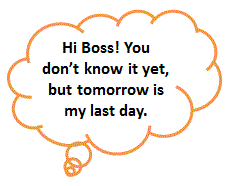 When leaving a job, we all know it is best to part on good terms. You know…don’t burn any bridges. HOW you quit will stay in people’s memories long after you’re gone.
When leaving a job, we all know it is best to part on good terms. You know…don’t burn any bridges. HOW you quit will stay in people’s memories long after you’re gone.
I recommend that people set an objective for how they want to quit and be clear why it benefits them.
For example:
- Leave with a solid reputation – because it provides source of positive referrals for future companies, or the possibility of returning to your former employer.
- Exit with all of the compensation you’re entitled to – because waiting until your stock or 401K vests, or for a bonus, provides money that you may need or help cushion you through a transition.
- Quit as soon as you’ve mastered a skill, or launched a successful program – because leaving while you’re confident and proud of your work is the ideal attitude to have while launching into your next phase.
Having an objective for the way that you want to leave your job gives you something to hold onto when you’re having a particularly bad day. It is a reminder of why you aren’t storming out of the office – you’re determined to quit on your terms.
I have to note, though, that I interviewed people who reached a breaking point at work and quit suddenly. After being yelled at in front of his coworkers, one customer service representative told his supervisor that, “I will no longer allow you to treat me this way. I quit.”
Another woman I spoke with was so miserable that she couldn’t take one more day of work. She went into work, got a few things from her office, and told her manager on the way out, “I’m quitting today.”
While it is prudent to leave on good terms, the people I spoke with had no problem finding other jobs. They had felt crushed by their old jobs and standing up for themselves was a way of taking their power back. It reminded them that in fact, nobody had the right to treat them abusively.
And then there’s Marina Shifrin, who became famous for her dance video resignation letter.
How I Got From There to Here
When I first decided that I needed to leave my corporate job for my health and happiness, I didn’t know what else I would do for a living. It was the summer of 2012, and while recovering from a series of cold and flu’s, I read several of Martha Beck’s books. Most notably, Finding Your Way in a Wild New World, that I link to on my Resources page (I receive a small commission for items purchased through this link and appreciate them very much!). The book helped me broaden my thinking and to expect to discover little hints and nudges that would point me towards my next career.
I also did a series of mind mapping exercises. I took blank paper and markers and wrote words that described what I valued, what I enjoyed, and what I was good at. Then I drew lines to connect the words and phrases that had something in common with each other. What I discovered surprised me – I was very interested in ambiguous problems, and doggedly researching clues and analyzing my findings until I had a resolution. And then I liked to write up my results in a report. As I considered what I’d learned from Martha Beck’s books and looked at my mind maps, I thought the obvious conclusion was that I should be a detective. More specifically, a Private Investigator.
All the pieces lined up: I wanted to focus deeply on finding the truth and the details in missing persons cases, skip-tracing people who failed to show up for court dates, and run background checks. The results of which I could package into neatly organized reports for my clients.
I was so certain that this was my next career move that I got certified to work as a PI, wrote a business plan, took a human footprint tracking course, and registered a domain name for my future investigation business: Truth and Details.
As I completed more and more of the items in my plan to quit my job, I decided that immediately after quitting I would spend a month in writing classes at Boulder’s Jack Kerouac School of Disembodied Poetics before launching my PI business. Then in the weeks before heading out to Colorado, a former colleague and I decided to start a real estate investment company that would democratize the way people invested in rental properties.
Suddenly, the PI business was on hold: I could start that at any time. I wanted to immerse myself in writing for a month and then when I got home, to bring this new business idea to life. The writing classes were great. The real estate business didn’t take off. I still believe in the concept, but it would have been a risky, long-term investment and I needed income.
So I turned to consulting, which I always thought of as a backup plan. It turns out that I love consulting, and use many of the skills that attracted me to investigation work. I like to unravel clients’ problems, analyze data, formulate solutions, and wrap everything up in a tidy report-out of results.
I did not transition into the business I planned on in 2012, but taking those steps gave me the confidence and preparation I needed to get to where I am now: in a satisfying career that aligns with my interests and skills. It is interesting that my company name and values remained the same: providing clients the truth and details they need to achieve their objectives.
What I Learned About Business from Improv Acting Class
 A few months after I quit my corporate job, I signed up for an eight-week improv acting class. We met for two and half hours on Wednesday evenings at a community center where we practiced improv techniques. I realized that much of what we learned applies to business.
A few months after I quit my corporate job, I signed up for an eight-week improv acting class. We met for two and half hours on Wednesday evenings at a community center where we practiced improv techniques. I realized that much of what we learned applies to business.
Three improv lessons are especially useful:
- Yes, and
- Commit
- Know When to Exit
Yes, and
In improv, this means you go with the direction your improv partner has started in order to keep the scene going. Cooperating and adding to the foundation that your partner set is what builds the story line and keeps the momentum going.
In business, if you were taught best practices in brainstorming sessions, you have already learned this. What it means is that when someone makes a suggestion, you say “yes” and then add your idea about how to make it even better. That way, whether you think their idea has merit or not, you’re keeping the positive flow of ideas coming and contributing in a positive way.
Commit
 In improv, once you enter the scene as a space alien coming to kidnap Santa Claus, you talk and act like a space alien on a mission to get Santa. If you get embarrassed and limp through your scene, it isn’t going to be enjoyable for you or the audience. If you decide you don’t want to be a space alien and try to change to something else, then you’re screwing up the scene for your partner who is playing Santa.
In improv, once you enter the scene as a space alien coming to kidnap Santa Claus, you talk and act like a space alien on a mission to get Santa. If you get embarrassed and limp through your scene, it isn’t going to be enjoyable for you or the audience. If you decide you don’t want to be a space alien and try to change to something else, then you’re screwing up the scene for your partner who is playing Santa.
In business, this boils down to deciding what your objective is, how you are going to execute upon it and then doing it. Being unclear about your objective confuses the people who need to take action. Changing tactics midway through projects wastes time and money.
Know When to Exit
In improv, sometimes an actor says a great line that is a perfect finish to the scene. The audience laughs and everyone recognizes that it’s complete. That is the time to exit and let the next scene begin fresh. Any added words or actions after that point dilutes the powerful impact that was made and it becomes less funny.
Another time to exit the scene in improv is if the scene isn’t going anywhere, it is dragging on, and the players can’t seem to fix it. The best thing to do in that case is wrap it up and move on to the next scene.
In business, there are many great applications to this lesson. You’ve won the client’s business: now shake hands and get out of their office. You’ve agreed upon next steps in the meeting: close up the laptops and get back to work. You had a great success with a product promotion that has now ended: take the lessons learned and move onto the next promotion.
And in the case of the project not going anywhere…knowing when a product or program is not viable is much more valuable than trying to force it to happen. Accept the sunk costs and move on.
This can also be applied to a job. When it becomes clear that your job is not going the way you need it to, making the decision to exit could be the best way for you to bring the scene to a close on your own terms.
If You Want to Quit Your Job in 2015, Check These Items Off Your List by December 31st
If you’re planning to quit your job in 2015, there are multiple things you can do before the end of the year to be better prepared.
Use your healthcare benefits. This is especially important if you’ve met your deductible for 2014, or are getting close. If you move to a new employer, your healthcare benefits may have higher deductibles or lower co-pays, or exclude the practitioners that you currently see.
Don’t forget the optometrist! Even if you have never worn glasses or contacts before, if your benefits include an eye exam, it is worth looking into (ha!). Or, if you have been wearing the same lenses for a long time, your vision might have changed. Many eye care benefits allow for one set of prescription glasses or contacts each calendar year. If you get new glasses now, you could also get prescription sunglasses or contacts in January.
My vision constantly gets better or worse. When I switched to private insurance, I no longer had optometrist benefits. Fortunately when I had benefits in the past, I got new glasses each year as my prescription improved or worsened, so now I can rotate through them as my sight changes.
Get your charitable donations matched. If your company has a charitable gift-matching program, take advantage of it by making your donations now.
If you can afford it, max out your employer-sponsored retirement saving plan. Got a 401(k), 403(b), 503(b), or another annualized retirement saving plan that your company matches? Most plans start over on January 1st. If you aren’t able to contribute the maximum limit, can you contribute enough to receive your employer’s highest matching amount? This is part of your earned compensation. Don’t leave it behind when you go.
If you’re trying to save money, consider taking less vacation time this holiday season so that you can cash it out when you quit. If you work for a company that is slow during the holidays, this can be a great time to be on the job anyway. It will be quieter and calmer, and you can work on the projects that are most important for you to accomplish before you leave. You can also use the extra privacy to print paystubs, retirement plan or stock details, and your past performance reviews.
Enjoy your holiday bonuses. If your employer gives cash bonuses or gifts in December, take an extra moment to savor them. To everyone else they are end-of-year extras. For you, they are your parting gifts.
Why it’s Smart to be Prepared to Leave Your Job on a Moment’s Notice
Whether you plan to quit your job now or never, it is smart to be ready to leave on a moment’s notice. It’s not about being fearful that you might lose your job. It’s about gaining confidence by being prepared.
Here’s why it’s important:
- Being ready to quit is like having a grab-and-go bag for your career. Tomorrow might be your last day at work whether you want it to be or not. Layoffs happen, businesses fail, companies relocate. Job security is more of a wish than a reality.
- You’ll be empowered. You’ll have options and will be less dependent on your employer to meet your financial needs and your personal career goals.
- You may be more successful at your job. Feeling that you can leave at any time, you might take smart risks that pay off. You might speak up more, and get more attention for your projects.
- You’ll be more agile. If you’re shoulder-tapped to transfer to a new role or new location, you can change gears quickly. Or you can say no and let the chips fall where they may, because you’re ready for it.
There are multiple components to being fully prepared that involve finances, health, shoring up support and more. If you don’t know where to start, take a look at your work tools. If you’re using a computer or cell phone provided by your employer, would you be ok if you were asked to hand them over tomorrow? If not, wipe all your personal photos, documents and data from your employer’s property. Stop using your company’s email address for personal communications. Make sure you have copies of your address book on your own computer and phone.
Another step is to make sure you’ve got copies of important information safely stored at home. This includes copies of your performance reviews and records of awards and achievements, so you can use that information to customize resumes in the future. It also includes having a portfolio of work samples that you can use in future interviews or as resources in your next role. Work samples could be snapshots of projects you worked on, non-confidential reports and presentations, or tangible materials that you produced. Make sure to take home financial documents like recent pay stubs and information about company-sponsored retirement plans and investments.
A third place to consider is your work space. Years ago my office was draped in personal belongings. I had two lamps, framed art on the walls, and a bookcase full of books, awards and photos. I even had hippie beads hanging from my door frame. (Don’t judge – people loved my office!) But when I left my office for the last time, I walked out with a single cardboard box of personal items. As I was working through my exit plan, I slowly swapped out the objects that were most important to me with fewer and more portable pieces. If you make this transition thoughtfully, nobody else will notice. But you’ll have the satisfaction of knowing you could hold your cardboard box in one hand while you use the other to wave ‘bye.
Once You Decide to Quit Your Job, You Might Enjoy it More Than Ever
It is a phenomenon that I heard over and over from people who I spoke to about quitting their jobs. Once they decided on a specific date to resign, they started enjoying their work again.
Most of these people were waiting for an event several months in the future, like receiving an annual bonus, before they announced that they were leaving. So while they knew that they were on their way out, their coworkers and managers did not.
This secret changed the way they thought, felt and behaved at work. One woman who spent half a year planning to quit her law firm said, “Those were the best six months of my career.”
These are the reasons why deciding to quit made employees like their work again:
They spent more time with coworkers they cared about. They knew that they weren’t going to see them five days a week anymore and would miss them. They made a point to stop by their desks to chat, eat lunch together and enjoy their company while they still could.
They stood up for themselves. On the flip side of missing their friends, there were other coworkers that they were looking forward to never seeing again. Until then, instead of ignoring or downplaying passive-aggressiveness or behavior designed to humiliate them, they told the offenders that it wasn’t OK to treat them that way.
They took more risks. All those great ideas that were tamped down out of fear of failure suddenly had new potential. Instead of going along with their managers’ terrible business proposals, they pointed out how different approaches would generate better results.
They set boundaries. They stopped working late nights and went home for dinner. They put their smartphones down and spent their weekends with friends and family, having fun and relaxing.
They kept it in perspective. Instead of getting worked up about the crap their bosses said, their long commutes and inane company policies, they reminded themselves that in a very short time it wouldn’t be their problem any longer.
All of this adds up to taking their power back. They had a lot less to lose since they were on their way out and wouldn’t be around to be punished in the next annual review. They stopped being afraid and started prioritizing their health, relationships and happiness.
Wouldn’t it be great if employees treated themselves with this level of self-respect all the time, not just when they are about to quit?
Multiplying by Zero
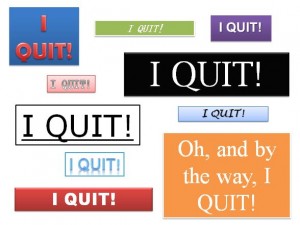 Years ago I was working for a company that I cared about enormously. I was loyal and worked hard and really wanted to be there. But during the last year or so of my employment, things got weird.
Years ago I was working for a company that I cared about enormously. I was loyal and worked hard and really wanted to be there. But during the last year or so of my employment, things got weird.
I would do something very well and it would be ignored. For example, the company used logos that were different sizes and fonts. I changed them to be consistent and not only did it look better, but it eliminated an entire set of decals that were being printed and stored, which saved about $5,000 every month. The reaction was somewhere between a yawn and a blank stare.
Another time I was chastised for not going out to dinner with a group of salespeople the night before a customer event. I skipped the dinner because I was at the office making final preparations late into the night. I prioritized making sure details were in place for a successful event. They prioritized the social aspect of having an evening out with their coworkers. I was told that it seemed like I wasn’t a team player. Huh? The event went well, anyway.
This stuff was so strange to me. I liked most of the people that I worked with and it was confusing to have people that I cared about say and do things that just didn’t make sense.
I will never forget the advice I got during a graduate school leadership class. I was explaining the situation to one of my classmates and he said that he had a job that was like that once. I asked him how he resolved the problem. His answer was “I quit and got a job somewhere else.”
That statement shifted my thinking. I had put all of my energy into trying to understand the situation and fix it because I truly wanted it to work out. I started to realize that no matter how much I wanted it to get better and despite believing that my work benefited the company, I was only part of the equation. Maybe that seems obvious to other people, but until then I kept thinking that if only I could figure out what to say or do, the people around me would act more rationally.
Not long after the conversation with my classmate, one of the vice presidents at the company bought everyone a copy of the book Who Moved My Cheese by Dr. Spencer Johnson. It’s a parable that basically says, “If you’re no longer getting what you need in your current environment, go get it somewhere else.” The minute I put down the book I picked up the phone and called a staffing company. I made the call on a Monday and on Friday I interviewed for a consulting contract. I was hired the next Monday. Eight months after that I took a full time position and spent another twelve years working there.
Most of my thirteen years there were great. The last few were not. Again, I had years invested in the company and there were enough good things about it that I kept looking for jobs on other teams and waiting for the next reorganization to see if it would make things better. None of that worked. I came up with my own analogy: it was like multiplying by zero. It didn’t matter how many hours I worked or what impact my programs had on the business. Everything that I did was cancelled out because where it intersected with the organization was like multiplying by zero. The end result is always the same. Zero.
One year ago today I quit that company. Now my happiness is multiplied each time I find projects that align with my values: working with people I respect, flexibility to work at home, the ability to make an impact through my projects and fair pay.
It isn’t always easy on my own, but the math makes sense.

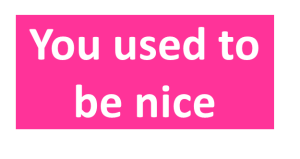


Recent Comments